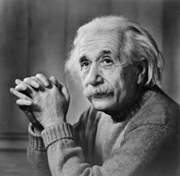 Fred Jerome and
Rodger Taylor unearthed a wealth of writings by Albert Einstein on the
topic of race that society has previously ignored. “Although
Einstein’s anti-racist activities are less known than his efforts on
behalf of international peace and scientific cooperation, he spoke
vigorously against racism,” says Jerome. “He admired and collaborated with Paul
Robeson and W.E.B. DuBois,” continued the researcher and writer.
Einstein is best known for his general theory of relativity.
Fred Jerome and
Rodger Taylor unearthed a wealth of writings by Albert Einstein on the
topic of race that society has previously ignored. “Although
Einstein’s anti-racist activities are less known than his efforts on
behalf of international peace and scientific cooperation, he spoke
vigorously against racism,” says Jerome. “He admired and collaborated with Paul
Robeson and W.E.B. DuBois,” continued the researcher and writer.
Einstein is best known for his general theory of relativity.
Einstein’s public response to American racism first occurred while he
was living in Berlin. He was one of many Germans who formed a
committee to save the Scottsboro Boys. The German-born Jew
co-chaired with Paul Robeson the American Crusade to End
Lynching. He also protested the frame-up and execution of Willie
McGee in Mississippi. His
article “To American Negroes,” appeared in the 1932 issue of The Crisis, then edited by W.E.B.
DuBois.
Jerome and Taylor contend that one explanation for this historical
amnesia is that Einstein’s biographers avoided controversial topics,
fearing that mention of these details might tarnish the feel-good
impression his image lends to science, history, and America. Racism is America’s “worst disease,” the
1921 Nobel Prize winner for Physics once said.
The most elusive statement by Einstein says the authors, was a 1946 speech he gave at historically Black
Lincoln University. Though they could not find the
speech, they did find extensive reports on that speech, including
quotes, in the Black press. (Rutgers University Press, $23.95)

